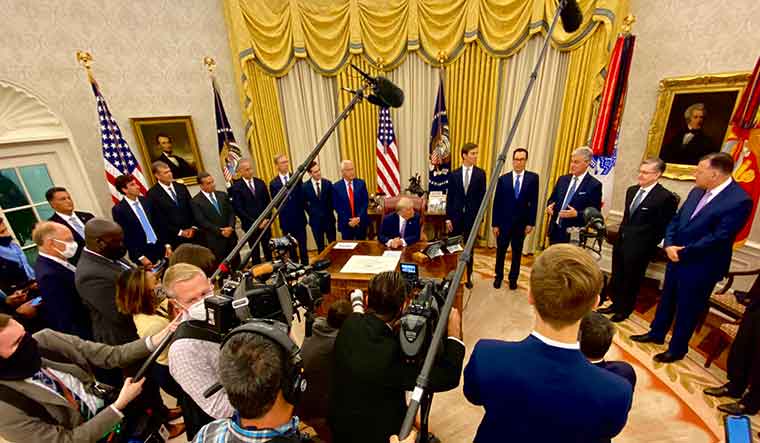Since the United Arab Emirates was founded, it has—along with most other nations in the Middle East—refused to recognise Israel. There were no direct flights between the two nations, Israeli citizens were not allowed to enter the UAE, and even international travellers who had an entry stamp from Israel would fin themselves barred from entry.
On Thursday, US President Donald Trump made the historic announcement that after 49 years, the UAE and Israel would normalise relations—in exchange for Israel’s withdrawal from parts of Palestine it was accused of annexing.
“HUGE breakthrough today! Historic Peace Agreement between our two GREAT friends, Israel and the United Arab Emirates,” Trump tweeted.
In a joint statement by Israel, the US and the UAE, the three countries declared a “historic diplomatic breakthrough” that would “advance peace in the Middle East region”.
“President Donald J. Trump, Prime Minister Benjamin Netanyahu of Israel, and His Highness Sheikh Mohamed bin Zayed Al Nahyan, Crown Prince of Abu Dhabi and Deputy Supreme Commander of the UAE Armed Forces, spoke today and agreed to the full normalisation of relations between Israel and the United Arab Emirates,” the statement said.
Joint Statement of the United States, the State of Israel, and the United Arab Emirates pic.twitter.com/oVyjLxf0jd
— Donald J. Trump (@realDonaldTrump) August 13, 2020
The deal came about following lengthy discussions that were only recently accelerated, White House officials told Reuters.
“Delegations from Israel and the United Arab Emirates will meet in the coming weeks to sign bilateral agreements regarding investment, tourism, direct flights, security, telecommunications, technology, energy, healthcare, culture, the environment, the establishment of reciprocal embassies, and other areas of mutual benefit. Opening direct ties between two of the Middle East's most dynamic societies and advanced economies will transform the region by spurring economic growth, enhancing technological innovation, and forging closer people-to-people relations.”
“As a result of this diplomatic breakthrough and at the request of President Trump with the support of the United Arab Emirates, Israel will suspend declaring sovereignty over areas outlined in the President’s Vision for Peace and focus its efforts now on expanding ties with other countries in the Arab and Muslim world. The United States, Israel and the United Arab Emirates are confident that additional diplomatic breakthroughs with other nations are possible, and will work together to achieve this goal.”
The agreement came after a phone call between Trump, Israeli Prime Minister Benjamin Netanyahu and Abu Dhabi Crown Prince Sheikh Mohammed Bin Zayed on Thursday.
During a call with President Trump and Prime Minister Netanyahu, an agreement was reached to stop further Israeli annexation of Palestinian territories. The UAE and Israel also agreed to cooperation and setting a roadmap towards establishing a bilateral relationship.
— محمد بن زايد (@MohamedBinZayed) August 13, 2020
The joint statement added that the UAE and Israel would expand and accelerate cooperation in the treatment of and vaccine development for the coronavirus. “Working together, these efforts will help save Muslim, Jewish, and Christian lives throughout the region,” the statement said.
The statement added that the UAE, US and Israel would launch a “strategic agenda” for the Middle East to expand “diplomatic, trade, and security cooperation”, noting that the three “share a similar outlook regarding the threats and opportunities in the region”.
All three nations have tense relations with Iran, one of the biggest powers in the region after Saudi Arabia and Iraq.
It can be noted that on July 5, Israel and the UAE made tentative first steps towards working together, with the UAE’s G42 companies signing an MoU with Israel’s Rafael and the Israeli Aeroscpace Industries to find COVID-19 solutions.
The statement explicitly thanks Trump for helping broker the deal.
“The United States and Israel recall with gratitude the appearance of the United Arab Emirates at the White House reception held on January 28, 2020, at which President Trump presented his Vision for Peace, and express their appreciation for United Arab Emirates’ related supportive statements.|
“The parties will continue their efforts in this regard to achieve a just, comprehensive and enduring resolution to the Israeli-Palestinian conflict. As set forth in the Vision for Peace, all Muslims who come in peace may visit and pray at the Al Aqsa Mosque, and Jerusalem’s other holy sites should remain open for peaceful worshippers of all faiths.”
It added that Israeli Prime Minister Benjamin Netanyahu and Abu Dhabi Crown Prince Sheikh Mohamed bin Zayed Al Nahyan express their “deep appreciation to President Trump for his dedication to peace in the region and to the pragmatic and unique approach he has taken to achieve it.”


